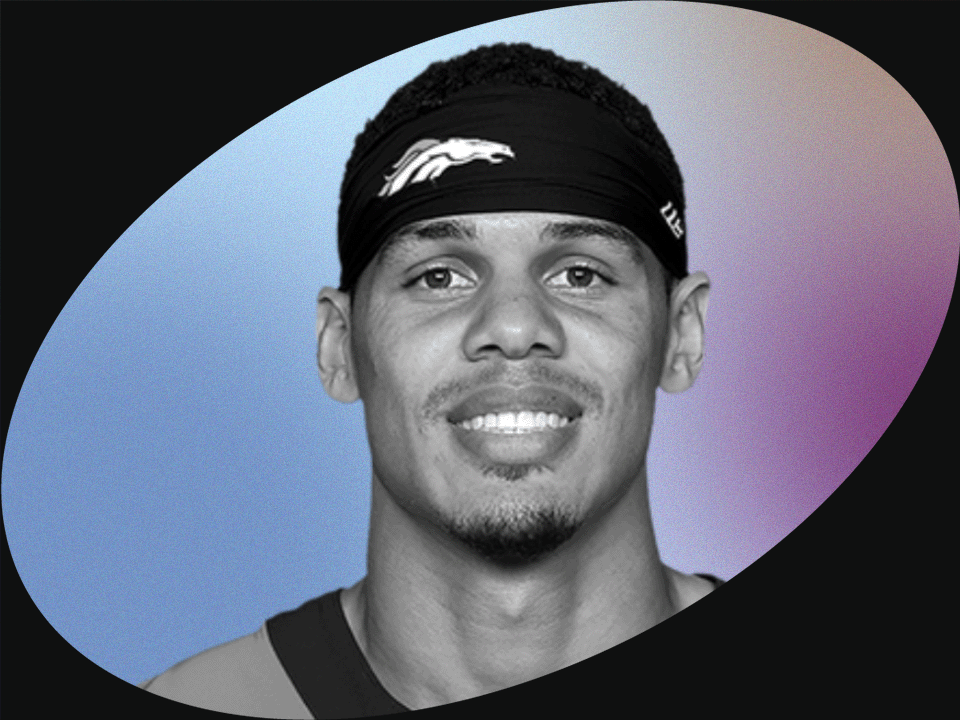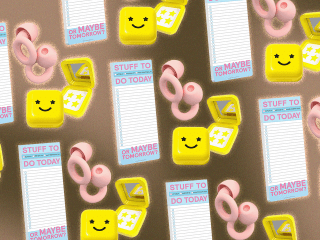Justin Simmons Wants You to Ask for Help
The Denver Broncos safety knows talking about mental health can be hard.
Justin Simmons has had a season of really high highs (he and his wife, Taryn, welcomed a son in October) and some setbacks (a knee injury kept him off the NFL field for a few games). But through it all, the Denver Broncos safety has centered his mental health, shifted his perspective, and figured out a way to make it all work. Here, the pro athlete talks to Wondermind about ditching the stigma about men and mental health, reaching out for help, and why he’s proud to work with White Flag, an app that encourages anonymous peer-to-peer mental health support so you can connect with people who get it.
[Sign up here to never miss these candid conversations delivered straight to your inbox.]
WM: How are you doing lately?
Justin Simmons: Lately, I've actually been doing pretty well. I'm in good spirits. It’s been three days now, since [we welcomed our] baby boy into the world, so that’s been really fun. I have two older daughters: One is four, and the middle one is one. It [gives you] a new perspective [and] kind of puts everything back in perspective. So life is pretty good right now.
WM: You also recently returned to the field after being out for an injury. How does it feel to be back while also entering this new chapter in your personal life?
JS: It was a little bittersweet because I had to find a new way to lead. Being one of the leaders on the team and on the defense, missing time was not ideal. I'm a guy that, in the past five seasons, I haven't even missed a snap. To miss four games was tough. But I say bittersweet because I was able to be around the family a little bit more. My wife was obviously really pregnant, so I was able to help with the other two kiddos a little bit more. And then I was able to help some of the younger guys on the team coaching-wise and things like that.
But I'm definitely excited to be back into a flow and playing with the guys 'cause there's nothing like going out there and playing with the guys that you put in work with week in and week out.
WM: You recently joined White Flag’s team as their chief advocacy officer. What made you want to partner with them?
JS: White Flag does such tremendous work. The thing that drew me was the attention and the help that they give to all the different subtopics within mental health. There are like-minded people that are dealing with situations similar to yours. Because a lot of times when we're going through stuff, we feel like, I'm the only one going through this. No one could understand how I'm feeling, what I'm going through [or] what this looks like. For White Flag to offer an app where you can post that—and it can be anonymous—[is huge].
A lot of times I feel like I have to bottle up my emotions, and I can't simply say, “I need help.” Three easy words you would think are easy to say are honestly probably the toughest things to bring forth. So I love that White Flag has an app where it is anonymous. You are saying, “Hey, I am dealing with this,” and all it takes is for someone to scroll on the feed and hey, there's a connection. … Like, “Hey, I was dealing with this. I went through this. This is what helped me. How can I help you?” I feel [messages like that can] go such a long way.
WM: What helps you in your personal life to reach out for help when you need it?
JS: It took a long time. I've recently realized that I have bottled up a lot of stuff that I'm going through, which is a stigma on most men. I'm the father to my children. I'm the husband to my wife. I'm the oldest of two younger brothers. So I feel like a lot of times I have to be strong, and I have to show I'm not dealing with anything right now and that I can push through.
I could feel the weight of that in recent years. I think the [pandemic] broke me out of that; I finally just broke down. I was like, “Man, I can't do this. I'm dealing with a lot.” Things at work aren't going well, things at home, whatever. It finally just took me to a point where I just was like, I need help. I'm not mentally in the right space.
I started having those conversations with my wife, and I was so thankful for her and for her to just sit there and listen. Now we do things together that have really helped us, and it's helped my mental health in general, [like] counseling, and we talk to some of our friends that we enjoy spending time with on a more regular basis. That's picked up our mood in general. Little things like that have really helped me.
WM: What's something else you've improved about your mental health over the years?
JS: The number one thing is putting that stigma to the side [and remembering] that it's not all on my shoulders. I don't have to bear the intensity of thinking that I have to figure this out, or I have to get this done, or it is all up to me. I don't have to carry that weight. I have people in my life that want to support me, that want to be there for me, that want to help and see me succeed in life. So [I need to use] those resources, and that really starts with being able to say, “I need help.”
WM: You do a lot of advocacy work with young people through your foundation and have talked about childhood bullying. What advice do you have for young people about the importance of mental health?
JS: There's no requirement on what you're dealing with that is too much or too little for help. That’s the beauty of realizing the [power of acknowledging], Hey, I am going through something, and it may not be what you're going through, and it may not be what this person's going through, but it's happening to me, and it's affecting me—no matter how big, no matter how small. There are people out there who really want to help you and see you succeed. Counseling may not always be for everyone, but there's someone in your life that cares for you and wants to help you. Find and make sure you have that network that’s going to help you in the long run with staying on top of it.
Your mental health is the most important thing you need to take care of. Everyone's talking about your physical health and taking care of your brain in terms of learning and knowledge and things like that. But I would argue your mental health is the most important thing because if you could take care of your mental health, all those other pillars in your life will fall into place.
This interview has been edited and condensed for length and clarity.
Wondermind does not provide medical advice, diagnosis, or treatment. Any information published on this website or by this brand is not intended as a replacement for medical advice. Always consult a qualified health or mental health professional with any questions or concerns about your mental health.




